“I am sitting there, waiting for the phone to ring. No one has called in the past hour. I start thinking about all the productive things I could be doing at home. Then, there is a knock at the door. It’s a young girl in her twenties. She looks weary and sad. I welcome her and invite her to sit with me for a moment.
She looks into my eyes, sees the smile on my face, and bursts into tears. She has kept this a secret and feels all alone. She is tormented by her circumstances and fear of what to do next. She thought no one would understand or love her again. But, then she found her way to me. Somehow she knew, just by being in my presence, that I would help her. I am here for her. She will make it through this after all. She is not alone!” This is the picture of a day at Birthright painted by Monica Walton, a Birthright volunteer for 21 years.
The organization needs new volunteers so it is hosting a training session in May.
Birthright believes “It is the right of every pregnant woman to give birth, and the right of every child to be born.” That has been the Birthright way since it was founded in 1968 by Louise Summerhill in Canada. Birthright of Jackson began in 1983. Every Birthright chapter adheres to the same charter which has remain unchanged since its inception.
“It’s a very narrow focus of helping a woman take care of herself so she can take care of her baby,” said Walton, who also serves as director of Birthright of Jackson. “We simply welcome each client as a friend. We run a free pregnancy test and sit with her, listening to her personal story. Whatever problem she feels is a stumbling block in the pregnancy, we help her make a plan to improve her circumstances. Then she feels better able to carry the child to term,” she added. Birthright offers love, hope, friendship, information, practical help and referrals for as long as a woman needs their services.
Last year, Birthright of Jackson had 350 counseling sessions with clients. Twenty-seven clients were considering abortion. Of the 16 pregnancy tests administered, 12 clients reported back with information on the birth of their child. The remaining four either had a miscarriage or abortion, or Birthright lost contact with the client.
“We don’t always get to hear the outcome of our interaction with these women,” said Walton. “Sometimes, their phone service is disconnected or they simply stop taking our calls. But, it is so wonderful when we do get to meet the babies and see the change of heart these mothers have experienced!”
“I had volunteered at the hospital and at hospice ministries, but I didn’t find either fulfilling,” said Lou Runnels, Birthright volunteer from Flowood St. Paul Parish. “Volunteering at Birthright filled a void in me, even though I didn’t know what was missing. Meeting clients makes me feel good. We make a connection and I know I have made a difference in their lives.”
Runnels, who has been a Birthright volunteer for two years, shared that she had an abortion at the age of 18. “I am able to give these girls information that wasn’t given to me 42 years ago when I had my abortion,” she said. “If I would have found a place like Birthright, I might have made a different decision,” she said.
“Helping with Birthright gives me peace of mind,” said Caroline Gaudet, who has been a Birthright volunteer, off and on for 20 years. “I know I am doing something for those who are very vulnerable, and I like Birthright because it’s non-judgmental and offers a sense of safety. That’s very important to me.” Gaudet is a member of Jackson St. Richard Parish.
Dennis Riecke has volunteered for Birthright as a board member for 20 years. He said Birthright is always in need of a variety of volunteers with different skill sets. “I wanted to do something in the pro-life movement, but I didn’t want to protest, lobby or be confrontational,” said Riecke, a member of Madison St. Francis Parish. “I’m not a counselor. I have taken minutes at board meetings and helped with fundraisers and other activities as needed.”
Volunteer training day will be Saturday, May 7, starting at 9 a.m. with coffee and a tour of the center at 644 Lakeland East Drive, Suite C in Flowood. We will discuss the services we offer, how easy and rewarding it is to volunteer, and conclude with a question/answer session and a light lunch. Everyone is encouraged to attend with no obligation. This is simply a chance to learn more, understand the needs of Birthright and their clients, and gauge your level of interest. Bring a friend!
Visit the Birthright website, www.birthright.org or contact Monica Walton by email: birthrightofjackson@gmail.com or by calling 601-371-7711.
Category Archives: Diocesan News
Vicksburg Parish kicks off anniversary year
By Alana Norris
The Vicksburg Post
VICKSBURG – This year marks a milestone anniversary for a local church, rooted deep in the history of Vicksburg.
St. Paul Parish is celebrating 175 years in Vicksburg throughout 2016.
A Show-Snack-’n’-Share Party was the first event the church sponsored from 2 to 4 p.m. Sunday, April 10, on the third floor of Farrell Hall located on Crawford Street.
This party was for parishioners and anyone with connections to the church to share photographs, mementos, and memories of times they spent at the church.
“I’m hoping that these folks will bring their memories and at the same time bring photographs they might have and help identify some of the people,” Glenda LaGarde, chair of the 175th anniversary committee, said in an interview for The Vicksburg Post published prior to the event.
She said there are plenty of pictures and newspaper clippings provided by the church, Vicksburg Catholic Schools and the Old Court House Museum. Guests could look through those and help identify the individuals in the picture to keep a historical record of the people and events that have happened in the church over the years.
The pictures go all the way back to the beginning in 1841. She said there are many photographs in the archives where she isn’t sure what war the men seem to be leaving for or what occasion those pictured are dressed up to attend.
“The date of the anniversary is Oct. 14, but we’re trying to get started early so we can gather from the people themselves what their stories are and what mementos they might have so that will help us in figuring out how we’re going to plan the grand finale,” LaGarde said.
Another part of the celebration is a Parish Tree of Life posted on a wall at the church where parishioners can write a memory, wedding date, First Communion date, or a name in memory of a former member on a paper leaf and paste it to the tree.
“I’m hoping that we get everybody, at least every family, but I’m hoping that we get most everybody to have a leaf on that tree with some little bit of their experience,” LaGarde said.
She said the church began as a chapel in a two-story building on the east side of Walnut Street between South and Crawford streets in 1841. Around 1849, she said, Bishop Joseph Chanche, the first bishop of the diocese, donated $500 and the Society for the Propagation of the Faith made an additional donation so the priest and parishioners could purchase the land and built a gothic revival style church where it is located today at 713 Crawford St.
That building was heavily damaged by the 1953 tornado, and the current church building was built following the disaster. It was completed in 1956.
“A lot of the older parishioners around here in town can probably still see in their gardens remnants from that because when they had to take it apart the parish let parishioners, if they wanted, to take something as a memento,” LaGarde said.
During the time before the new church was completed, services were held in the auditorium of what is now the Southern Cultural Heritage Center.
“You have to understand the past and the people that made it in order to guide what your choices are right now,” LaGarde said.
(This story ran prior to the event in The Vicksburg Post, it was edited and reprinted with permission.)
Mississippi bans dismemberment abortions
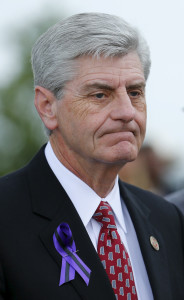
Mississippi Gov. Phil Bryant signed a law banning dismemberment abortions. (CNS photo/Mike Blake, Reuters)
By Catholic News Service
JACKSON, Miss. (CNS) — A new law in Mississippi will prohibit dismemberment abortions, effective July 1.
“This law has the power to change how the public views the gruesome reality of abortion in the United States,” Carol Tobias, president of National Right to Life, said in a statement.
On April 15, Mississippi Gov. Phil Bryant signed into law the Unborn Child Protection From Dismemberment Abortion Act, passed by the state Senate in a 40-6 vote in March and by the state House 83-33 in February.
“We applaud any effort to end abortion in our communities and will continue to support women in crisis through our efforts with Catholic Charities, adoption services, parish-based ministries and supporting organizations such as Birthright,” said Father Kevin Slattery, vicar general of the Diocese of Jackson.
“There are many faithful people out there working to give women the choice of life,” he said in a statement. “We hope we can continue to build and strengthen those ministries for people in need.”
Mississippi is the fourth state to enact the measure, after West Virginia, Kansas and Oklahoma. According to National Right to Life, the legislation — based on the pro-life organization’s model bill — also has been introduced in Idaho, Louisiana, Missouri and Nebraska and may be taken up in several other states.
The procedure is a form of second-trimester abortion that “dismembers a living unborn child and extracts him or her one piece at a time from the uterus.” It is called a D&E for “dilation and evacuation.”
According to the National Abortion Federation Abortion Training Textbook, “D&E remains the most prevalent method of second-trimester pregnancy termination in the USA, accounting for 96 percent of all second trimester abortions.”
It is different from the partial-birth abortion method used in late-term abortions, which is now illegal in the United States.
“When the national debate focuses only on the mother, it is forgetting someone,” said Mary Spaulding Balch, National Right to Life’s director of state legislation. “Banning dismemberment abortion in Mississippi has the potential to transform the debate when people realize that living unborn children are being killed by being torn limb from limb.”
Parishes invited to national African-American evangelization conference
The Office of Black Catholic Ministry for the Diocese of Jackson is one of the sponsors for the 2016 Interregional African American Catholic Evangelization Conference (IAACE) this summer and has a limited number of scholarships available to parishes.
The theme this year, ‘You are my witnesses,” is taken from Isaiah “You are my witnesses, declares the Lord, and my servant whom I have chosen so that you may trust me and understand that I am the one.”
The conference brings together presenters from across the nation to talk about evangelization from a variety of perspectives. Organizers use the National Black Catholic Congress’ youth and young adult principles to structure and guide this conference every year.
Keynote topics include using social media, how to bring dying parishes back to life, becoming an inviting and welcoming church, apologetics without apology, reaching inactive black Catholics, and sacred movement. Will Jemison, director of the diocesan Office of Black Catholic Ministry, is a featured speaker along with ValLimar Jansen, Father Anthony Michael Bozeman, SSJ of New Orleans and Sister Gwynette Proctor, SSND, from Baltimore.
“Our major goal is to ensure that the common thread of what it means to be a witness will permeate every aspect of the conference. This conference will provide excellent resources and life-giving faith experiences,” wrote the conference founder, Annette Mandley-Turner in her welcome letter.
“This event is a wonderful opportunity to hear from some of the best voices in African American evangelization from across the country,” said Jemison. His office is encouraging all parishes to participate.
The conference will be held Friday June 10-Sunday June 11, at the Galt House Hotel in Louisville, Ky. Registrations received before May 15 will cost $150. A hotel rate of $129 per night is also available until that time.
The day before the conference, ICCCE will offer a one-day institute for lay ecclesial ministers. The institute costs extra, but offers continuing education credits in three tracks: youth ministry, leadership for evangelization and formation.
To register, call J. Vincent Johnson, 901-634-0037, or email jvj6965@gmail.com. Those interested in getting financial assistance to attend should contact Jemison, 601-949-6935, or email at will.jemison@jacksondiocese.org. Scholarships will be granted on a first-come, first-served basis.
Music ministry workshop to feature nationally recognized speaker
CLEVELAND – Father Ricky Manalo, CSP, will lead a workshop for music ministers at Our Lady of Victories Parish Saturday, April 23, from 9 a.m. – noon.
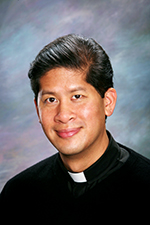
Manalo
Father Manalo, a Paulist and accomplished composer, currently teaches at Santa Clara University. He resides in San Francisco, Calif.
In addition to music and liturgy, he has studied sociology and culture and offers classes in multi-cultural worship all over the world. He is also used to working in multi-cultural settings.
His compositions have been published by Oregon Catholic Press, and he recently composed music for Mass settings during Pope Francis’s visit to the U.S.
“I met Father Ricky Manalo last fall and was impressed by his talent and the breadth of experience,” said Father Kent Bowlds, pastor at Our Lady of Victories Parish. Father Kent said he has wanted to offer a music workshop for some time and meeting Father Manalo presented the perfect opportunity to do just that.
Some of Father Manalo’s best known hymns include: Beyond the Day, With One Voice, Worthy Is the Lamb, and Mass of Spirit and Grace. Father Manalo is also known for pioneering and popularizing Asian Catholic liturgical music in the United States with his hymns, Many and Great and By the Waking of Our Hearts. He is a member of the North American Academy of Liturgy, the Catholic Theological Society of America, the 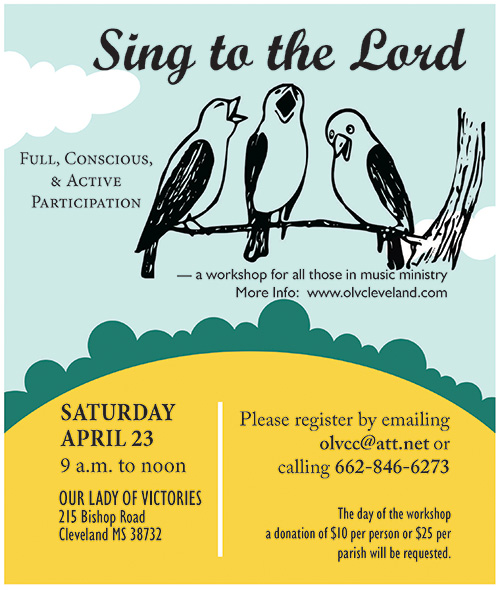 International Societas Liturgica, and the National Association of Pastoral Musicians (Board Member, 2008-12) and serves as an advisor to the U.S. Bishops’ Committee on Cultural Diversity in the Church and the Secretariat on Divine Worship.
International Societas Liturgica, and the National Association of Pastoral Musicians (Board Member, 2008-12) and serves as an advisor to the U.S. Bishops’ Committee on Cultural Diversity in the Church and the Secretariat on Divine Worship.
“Ever since Vatican II a key phrase guiding all liturgical gatherings has been “full, conscious, and active participation” — meaning that our Catholic liturgy, especially the Mass, is not a program to be passively watched,” explained Father Bowlds. “In order for it to be true praise of God by God’s people, our liturgy requires everyone to play his/her part whether by giving full attention, speaking the responses with conviction, or singing to the best of one’s ability.”
“Concerning music, those in parish music ministry know that though their individual talents will sometimes be spotlighted, their primary task is to involve the entire congregation. I hope that this workshop will give choir directors, cantors, choir members, accompanists and anyone else who is interested, the tools they need to lead congregations effectively,” he added.
Organizers are asking for donations of $10 per person or $25 per parish. Register by phone at 662-846-6273 or by emailing olvcc@att.net.
USTA tennis tournament benefits Catholic Charities
Faith Formation revises catechist guidelines
By Maureen Smith
Jackson – Among the projects in the works in the diocesan Department of Faith Formation this year: reinvigorate youth ministry with a new director, plans for diocesan gatherings and new energy; train and certify more lay catechists than ever; find a new director of family ministry; and revise the catechist companion, the book used as a guide for catechists in parishes and schools throughout the diocese.
Fran Lavelle is the head of faith formation. She works with diocesan coordinators and parish employees and volunteers to make sure Catholics can deepen their knowledge and faith at every stage of their lives. This means ensuring children in religious education are reaching certain milestones as they mature, offering rich faith opportunities to young adults and college students, preparing couples for marriage and supporting them in family life and making opportunities available for adults to explore church teachings and spirituality.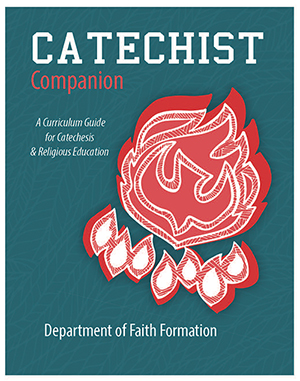
A cornerstone in ensuring that we are setting young Catholics on a path of life-long learning and a love of their faith is good catechesis. One of the major aid in this work is the Catechist Companion, a guidebook for teachers guiding students in religious education and preparing young people and their families for the sacraments of initiation. As Bishop Joseph Kopacz writes in his letter of introduction, “The most important work of the church is in passing the faith on to subsequent generations.”
“We want to respect each community’s approach to preparing their children for sacraments, but we also need to set some expectations of what they will know when they approach the altar,” said Lavelle. The book is a guideline, but different parish and school communities will offer the lessons in the way best suited to their students.
She and many others spent weeks going through the material to update and streamline it and hopes to set up a regular review schedule to keep it up-to-date all the time. Lavelle appreciates the assistance she has had in updating and revising the document. “It would have been an impossible task without the peer review group that reviewed the guide for continuity and having excellent colleagues at the chancery to help with layout and proofing,” Lavelle said.
The book is divided up by age-group and by sacrament. It contains not only the concepts students should grasp by the end of the grade or by the time they receive a given sacrament, but it also has suggestions on presenting the material to students and their families, including scripture readings families can use for reflection and prayers.
“It is through teaching these beliefs that we aid those entrusted to us to deepen their relationship with God. Moreover, we hope to inspire a love for learning, growing and loving our faith in a way that is life-long,” wrote Bishop Kopacz.
The revised book will be finished mid-summer and will be distributed in printed form to catechists. An online version will be posted to the diocesan website so anyone can download and use it.
Lavelle’s office also offers a full complement of classes to help catechists earn certification and exchange best practices so they can better serve their students as well as gatherings and workshops for catechists and pastoral leaders to share best practices and resources.
The Catholic Service Appeal (CSA) directly supports the department of faith formation. Your pledge to CSA supports the work Lavelle and her staff are doing to offer faith formation opportunities to everyone in the diocese. Donate through your parish office or online at https://csa.jacksondiocese.org/.
Jackson businessman makes Catholic radio reality
By Maureen Smith
JACKSON – Roger Venable is the first to admit he knows nothing about radio. “I have no business starting a radio station,” he joked a week after that station went on the air. The business owner and member of St. Therese Parish just felt called to try and get a Catholic station up and running in the Jackson area.
The low-power station, 107.9 FM, WJXC, took years of persistence, some creative energy and more than a little help from some friends. The station will carry Eternal Word Television Network (EWTN) programming for now, adding local programs as Venable is able.
Listeners in North Jackson will get a clear signal, while those in outlying areas may lose quality on stormy or windy days.
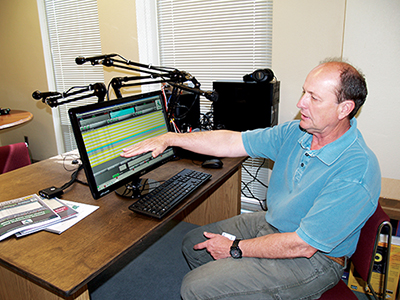
Roger Venable shows a visitor how a computer can play live or pre-recorded shows on his low-power radio station from the studios inside St. Dominic Centre in Jackson. The businessman hopes to find investors to help expand the operation. (Photo by Maureen Smith)
Venable said he always wondered why there was no Catholic broadcast radio station in the area and started doing research into what it would take almost 10 years ago. During that time, other station owners offered to sell their operations to him, currently operating stations offered limited time slots and lots of people offered advice.
About five years ago, the Federal Communications Commission, the agency that controls broadcast licensing in the U.S., opened up a number of new low-power frequencies on the dial. In order to be eligible, applicants had to have a 501c3 non-profit organization set up.
Venable raced to get the organization paperwork in order before the deadline and was able to land a permit. “When that piece of paper came in the mail, I could have fallen down on my back, I was so thrilled and surprised it all come together,” he said.
In the meantime, he got help from EWTN engineers on what equipment he would need and he approached Sister Dorothea Sondgeroth, OP, assistant director of the St. Dominic Health Foundation, about adding his antenna to St. Dominic Hospital. She not only found the perfect spot for the small structure, she also found a room he could rent at St. Dominic Centre for his studio.
EWTN will provide programming for free to any station, but only if the bishop in that diocese approves. Bishop Joseph Kopacz granted his approval for Venable to pursue the project last year and met again with him and ETWN’s Jack Williams on Tuesday, April 5, to talk about next steps.
Williams, who is the affiliate relations manager and an on-air personality, said the Holy Spirit is often evident in the work of the dedicated people who set up Catholic radio stations across the country. He told the story of when Mother Angelica, the determined nun who founded the network, first saw the property where she located her empire.
The acreage was on top of a mountain and she went to see it with an engineer. “She got out of the truck and looked at the field and she could see St. Michael the Archangel in the field. She said ‘we’ll take it!’ The engineer said, ‘we can’t take it, Mother, short wave radio won’t work on a mountain, it’s impossible for us to operate here.’”
Mother Angelica, said Williams, would not be moved. “She asked him, ‘can you see St. Michael over there?’ he said no, and she repeated, ‘we’ll take it.’” Despite the technical impossibility, Mother Angelica did found a short-wave radio station on the mountain and developed it into the largest Catholic broadcast network in the world. .
Venable took out a loan to start the station, but hopes to find underwriters and donors to pay off that debt and keep the station on the air. Once that happens, he hopes to start adding local programming. He has the capability to record programs in his small studio and insert them into his schedule. He also hopes to begin streaming his signal online so anyone can listen using their computer or smartphone.
Later in the summer, Venable will host an official kick-off event for potential sponsors and listeners. In the meantime, anyone who wants to underwrite a portion of programming or make a donation can send a check made out to Mississippi Catholic Radio to PO Box 43, Terry, MS, 39170, or email rvenable@venableglass.com.
Greenwood community needs votes for Lumen Christi
GREENWOOD – The Redemptorist community serving Hispanic Catholics in Greenwood has been nominated for the Catholic Extension Lumen Christi Award for the second time. Last year, the community got more votes than almost any other nominee in the first portion of the process. This year they are again asking Catholics in Mississippi for their support.
Every year, Catholic Extension’s Lumen Christi Award honors an individual or group working in one of America’s mission dioceses who demonstrates how the pow
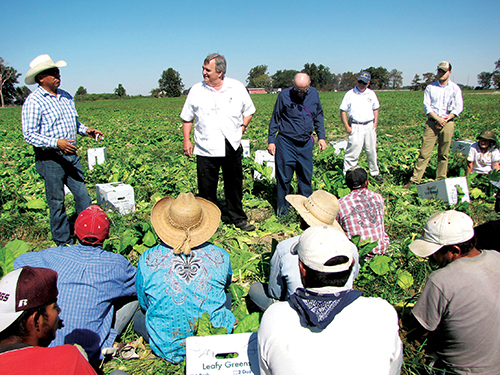
Members of the Redemptorist Manz community accompanied Bishop John Manz on a pastoral visit to Hispanics in the diocese in October 2015. Bishop Manz is a member of the U.S. Conference of Catholic Bishops’ committee on refugees and migrants. The Redemptorists took him out into the fields and factories where they are ministering to Hispanics across the diocese, but especially in the Delta. It is this work that has earned them a nomination for the Lumen Christi Award. (Mississippi Catholic file photo by Sister Maria Elena Mendez, MGSsP.)
er of faith can transform lives and communities. Lumen Christi recipients are the hidden heroes in our midst. They bring light and hope to the forgotten corners of our country and inspire those around them to be the “Light of Christ” as well.
Past recipients of the Lumen Christi Award, Latin for “Light of Christ,” have included priests, women religious, and lay leaders from across the nation.
The Lumen Christi Award is accompanied by a $50,000 grant to support the recipient’s ministry.
The process has two phases. During the first, people can vote for the ministry they think is the most deserving. From these votes, Catholic Extension selects finalists. A panel from the organization selects the final winner.
The Redemptorists came to Mississippi in 2014. The order reorganized in the late 1990s, forming teams of ministers who can go to different dioceses to help with Hispanic ministry. The team based in Greenwood travels throughout the Delta. They are creative in their outreach to the often invisible Hispanic community – offering reconciliation, Mass and prayer at restaurants, farms and trailer parks, seeking out opportunities to interact with families and making themselves available to parishes when needed. The priests travel quite a bit, going to where the people are to establish relationships. Their hope is to help the community develop lay leaders and ministers from within.
Voting takes place online, visit https://www.catholicextension.org/2016-lumen-christi-award-nominees#DioceseG to cast a vote daily.
Human trafficking workshop raises awareness, lays groundwork for action
By Maureen Smith
JACKSON – More than 70 people gathered at Christ United Methodist Church on Saturday, April 9, for a one-day conference on human trafficking with a focus on Mississippi and the Jackson area. The event brought together law enforcement personnel, teachers, clinicians, childcare and non-profit workers and concerned people. Two presenters spoke about how to recognize trafficking and how to help the victims and local organizations shared what they are doing to address the issue.
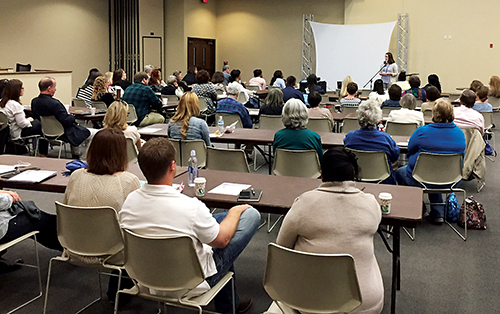
Almost 80 people attended a one-day human trafficking workshop at Christ United Methodist Church in Jackson. Organizers hope to use the awareness to spur action on the issue (Photos courtesy of Debb Tubbs)
Debb Tubb, communications director for Christ United Methodist Church, attended an awareness gathering last year called “Not in my city, not in my state.” “After I heard the stories I just had to ask myself, what is the next step?” She started speaking with Courtney Layson, the counselor on staff at the church, and they came up with this workshop in partnership with several other organizations. Ashleee Lucas, a representative from Shared Hope International, partnered with the church to identify speakers.
Last year, Belhaven University conducted a rapid assessment of domestic minor sex trafficking (DMST) in Rankin, Hinds, Madison and Warren counties. The report found that while awareness of this issue is on the rise, there is a tremendous amount of work to be done. “The consensus is that central Mississippi is not equipped to care for victims of child trafficking. There are no shelters that specialize in the needs of DMST victims. Many victims slip through the cracks or are mislabeled as juvenile delinquents because some first responders do not recognize the profile of a DMST victim,” reads the introduction.
The report goes on to explain that the most common kind of trafficking found in Mississippi is perpetrated within families – with relatives offering children to predators in exchange for drugs, money or goods. In some cases the victims are charged with crimes rather than being protected or rescued from their situations. Awareness within the community, training first responders, laws that specifically protect and address this issue and funding for treatment and training are all needed, according to the report.
People who attended the conference heard from Elizabeth Scaife, director of Shared Hope International, and Dr. Rebecca Johnson, of International Justice Mission. Sessions included training on profiling traffickers and victims, understanding the trauma the victims undergo “with our heads and our hearts,” gang trafficking and trauma care for victims. Local organizations involved in starting to address this problem were also on hand. A couple from Crossgates Baptist Church talked about their effort, Ministry 639, which offers care-package backpacks to suspected victims and tries to offer them resources.
Tubb said she was surprised about some of what she has learned about trafficking. “Just for me it was disturbing to learn that during the golf tournament that brought so many people to town the ‘back pages’ ads spiked,” she said. Back pages are websites known for offering prostitutes, often minors. “When events bring people to the area – how can we respond to that?” asked Tubb. The Belhaven report backs up that data. “…the face of prostitution and commercial sex is changing with technology. Many websites allow facilitators to advertise without ever walking the streets. Law enforcement identified the Internet as the main source for locating victims,” says the study.
Tubbs also learned that the profile of the “john” or customer is not what many people have in mind. “It’s not just what you might think of as a ‘sleazy hotel,’ it can happen at nice hotels and conference centers. White collar professionals feed money into the industry,” she said. Training law enforcement and supporting prosecution for the customers can help as well as offering treatment for men with pornography and sex addictions.
The workshop was just the start of raising awareness. “We have identified people interested in this ministry,” said Tubb. The next step is to process what they heard and have a follow-up meeting. “Anyone who wants to partner in this is welcome,” she said. Those interested can contact Christ United Methodist Church at 601.956.6974
Read the Belhaven Rapid Assessment online, https://sharedhope.org/wp-content/uploads/2015/03/MS-Rapid-Assessment-22715.pdf.
(Editor’s note: April is National Child Abuse Awareness Month. Mississippi Catholic will feature abuse awareness and prevention stories in each issue this month.)











